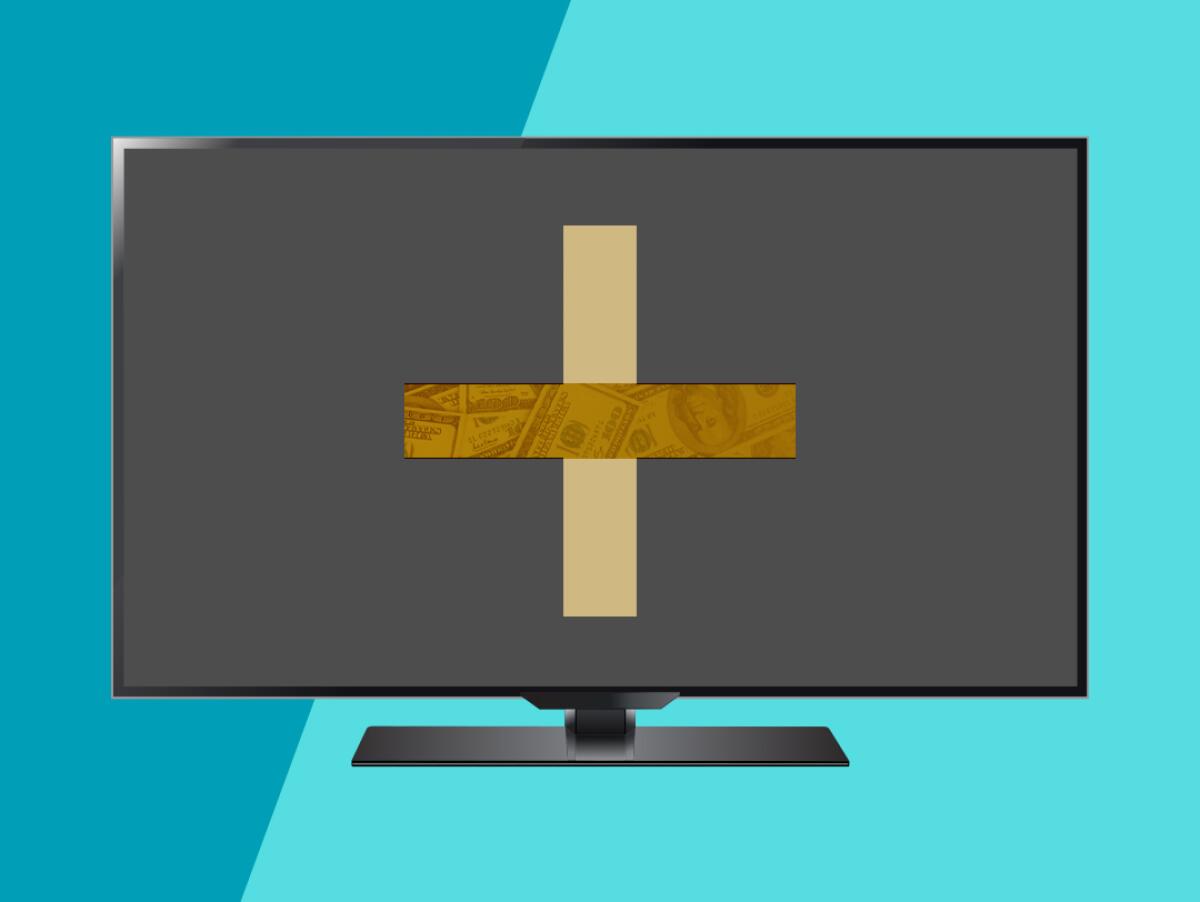Wide Shot: ‘South Park’ at 25; how to lose billions in streaming

Welcome to the Wide Shot, a newsletter about the business of entertainment. Sign up here to get it in your inbox.
First, a programming note: I’m going on paternity leave in a couple of weeks, so instead of turning the Wide Shot into a live journal of sleepless first-time fatherhood, you’ll be hearing from a number of different hosts.
Each week one of my brilliant Company Town colleagues will take over the newsletter and provide their own insights on the business behind the show. I know I’m looking forward to reading their takes through my one barely functioning eyeball. But anyway, you’re still stuck with me this week.
‘South Park’ turns 25
The entertainment industry’s streaming revolution and subsequent obsession with locking down well-known brands has proved highly lucrative for Trey Parker and Matt Stone, the creators of “South Park.”
In 2019, the pair sold the “South Park” U.S. streaming rights to HBO Max in a deal valued at roughly $500 million. Two years later, ViacomCBS — now called Paramount Global — inked a $900 million deal for Parker and Stone to continue the series through 2027 and create 14 new hourlong TV movies for Paramount+. Full “South Park” streaming rights go back to Paramount by 2025.
The often baffling streaming landscape has given them material as well as riches. A two-part special, “The Streaming Wars,” lampooned the rapidly shifting media landscape through a plot involving water rights and the return of climate-change surrogate ManBearPig. (It makes more sense when you watch it.)
I spoke with Parker and Stone about “South Park’s” longevity, how they try to keep the show fresh and their “deep fake” movie that fell victim to COVID-19. Here’s the full story.
And here are some highlights.
How are you keeping the series fresh after 25 years?
Parker: We’ll sit there in the writers room sometimes and just be so stuck, and I’ll be like, “How can we not know what the f— we’re doing after 25 years?” We never want to repeat ourselves. There’s definitely tropes, but for it to be funny, it’s got to be new. Just going, “Cartman is fat and he likes cheesy poofs” is not going to make us laugh.
Do the hourlong specials help open you up creatively?
Stone: I think it cuts both ways. I really like the “Pandemic Special” and the “Vaccination Special.” Like a lot of people, we had to go fully remote, so we had to come up with a new production process, and that was pretty painful. The longer ones are sometimes really satisfying because Trey gets to write stuff that breathes a little more.
But then, we just went back to do our first series of six regular 22-minute shows after the pandemic, and I thought they were really great. It’s almost like going back to our roots. It’s like a pop song that’s gotta be three minutes. These last hourlong specials we did were hard. We had a hard time finding our groove.
“South Park” is often very topical, but you’ve always said your favorite episodes were the ones with the kids just being kids. How do you balance that?
Parker: It’s easier to be fresh about something topical because it’s new. The writers room always starts with us sitting around a table going, “All right, what’s going on?” Just like in any office. But even in the season we just did, some of my favorite things were Butters riding a horse and Cartman living in a hotdog. Just kid stuff.
Right now the main “South Park” episodes stream on HBO Max in the U.S., but the hourlong specials are on Paramount+. Is that confusing for viewers?
Stone: Now that it’s gotten to a point where it’s on two different services, it probably is confusing. At the time, HBO Max was a big ascendant streaming service and it’s still got pretty great s— on it. So we weren’t bummed about that. At the end of the day, having it all living together will be great. But if you’re in a business for 30 years, that’s just not going to be the way it happens all the time.
I mean, HBO Max changed ownership between then and now. They were owned by AT&T. Now it’s Warner Bros. Discovery.
Stone: Everybody involved in that HBO Max deal — which felt like a great deal — got fired immediately, right? You can’t keep your head straight. We’ve been at Paramount for a long, long time, and we’re psyched that everything will eventually get unified. You work for a media company. You open the internet one day, and we work for somebody else. Everybody has that experience in media.
What was the closest you ever got to losing the show?
Parker: It was the same as everyone. It was the first few months of the pandemic, and it was the first time we were going, “Oh wow, maybe that’s just it.” Matt was the first one to say, “This thing’s gonna go on a long time. Let’s just start figuring out how to do it from home.”
Not a lot of people know that we were a day away from starting production on the first feature movie we had done since “Team America: World Police.” We were going to start shooting on the day that the pandemic shut everything down. It was months and months of getting ready for that movie, to just being like, “Nope, it’s over.”
I went to the office to start packing up my things because I was just kind of in shock. There was a few weeks of just depression, and then I just got happy ’cause I’m like, “I’m just gonna hang out with my daughter and watch ‘Harry Potter’ and build Legos.” And then Matt said, “Let’s go remote.”
What was that movie and what’s the status?
Stone: It’s sort of on hold.
Parker: It was very timely and the timeliness of it has passed. We’d have to majorly rethink it to do it now.
Stone: We were working on a “deep fake” movie [with actor and comedian Peter Serafinowicz]. We have a deep fake company [called Deep Voodoo], and we have all these deep fake artists working for us. Even though the script was sort of timely, we ended up keeping the deep fake part of the studio going. That’s another side project that we have, which is fascinating. The technology is insane. Many movies will be made with this stuff.
Parker: It was going to be “Deep Fake: The Movie.” It was about this guy who looked exactly like Trump because we deep-fake Trump’s face onto him. And it was this whole funny thing because, of course, it ends up with Trump just naked and getting run through the wringer and everything, and that’s why it was so funny and so timely.
Stone: I don’t know, he could be running again. The technology became the thing we stuck with. Kendrick Lamar used the studio to do one of his last videos.
Stuff we wrote
— After all those wild rumors, Warner Bros. Discovery laid out its strategy for combining HBO Max and Discovery+ for a U.S. launch next summer in a fairly straightforward earnings presentation. The stock dropped as Wall Street got an update of the combined company’s financials and updated (e.g., lower) profit forecasts. This comes as the industry reels over the cancellation of “Batgirl,” which was planned for HBO Max.
— Litigator to the stars. Top Hollywood lawyer Bert Fields has died at 93 after COVID battle. Fields represented some of the entertainment industry’s biggest stars, including Michael Jackson, Tom Cruise and Dustin Hoffman.
— Want to watch free TV? This station owner is here to help. This month, E.W. Scripps launched a website — TheFreeTVProject.org — where users can type in their ZIP Codes to learn what stations they can get for free in their area with an antenna.
— Headlines, headlines, headlines. AMC Networks gets a new chief executive. Arbitrator rules in favor of WGA in battle over Netflix residuals. NBC is moving ‘Days of Our Lives’ to Peacock.
Streaming’s money pit

Streaming is expensive. Media and entertainment companies want to adapt to changing consumer preferences, but doing so means creating a startup that costs billions of dollars a year.
Paramount Global last week said it expects to lose $1.8 billion this year from streaming services including Paramount+, a bigger hole than the $1.5 billion loss the company previously forecast. Losses from the business are expected to peak next year.
“Wow, that’s a lot of money to lose on streaming,” you might say.
And you’d be right, except for the fact that lighting cash on fire is pretty much the norm for newish streamers. The stats:
- Comcast Corp. expects to lose $2.5 billion on Peacock this year.
- Peacock lost $1.7 billion in 2021.
- Disney+ won’t be profitable until 2024.
- Neither will HBO Max/Discovery+.
Warner Bros. Discovery last week sought to manage expectations for its own streaming empire, saying the combined HBO Max and Discovery+ would reach 130 million subscribers in 2025, compared to the 92 million they count now. It should be profitable in the U.S. in 2024 and generate $1 billion in global profit in 2025, if CEO David Zaslav’s predictions are right.
The losses are not surprising, but they showcase the challenges of the business at a time when the direct-to-consumer financial model has come under question. Launching a formidable streamer means spending a boatload on content, technology and marketing. Content is more widely available than ever and viewers burn through shows quickly, meaning programming investments don’t go as far as they used to.
The numbers don’t even include the revenues and profits that companies are cannibalizing from their TV networks and movie studios.
But at the same time, while the market may be looking for belt-tightening, the streamers won’t really pull back much on spending. The competition is too fierce.
Catch-up reading...
— “Payola” in podcasting. (Bloomberg)
— Is Netflix suffering from a culture of fear? (Insider)
— A Hollywood VFX crisis. (Defector)
— How Disney’s Ursula changed the game. (LAT)
Finally ...

Watching: Maybe it’s low expectations, coupled with the dog days of summer, but I was really into “Prey,” the new “Predator” prequel on Hulu in which the technologically advanced alien faces off with a young Comanche warrior.
Listening: Nilüfer Yanya’s new album, “Painless,” is real good.
Inside the business of entertainment
The Wide Shot brings you news, analysis and insights on everything from streaming wars to production — and what it all means for the future.
You may occasionally receive promotional content from the Los Angeles Times.




